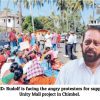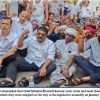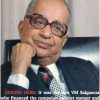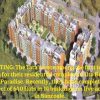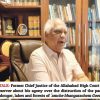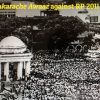Goa is abuzz with excitement as vintage bike and car owners, users, collectors and fans are decking […]
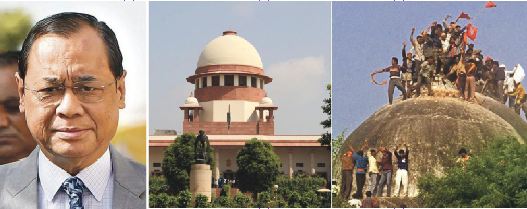
GOGOI STOOPS TO CONQUER!
Cover Story, Nov 16- Nov 22 2019 November 15, 2019COMPROMISE: In an attempt to maintain peace and prevent any clashes between the majority and minority communities. Justice Ranjan Gogoi has allotted the disputed land to the majority community and directed that five acres of land beyond the disputed area should be given to the minority community
BY RAJAN NARAYAN
Ranjan Gogoi, the retiring Chief Justice of India, like Portia in the ‘Merchant of Venice’, has given both the majority and minority communities their pound of flesh without spilling a drop of blood. On the face of it, it seems more of a practical compromise than justice in the strict sense of the word…
The Supreme Court judgment on Ayodhya reminds me of Shakespeare’s play ‘Merchant of Venice’. In the famous play, a Jewish moneylender ‘Shylock’ demands a pound of flesh back in return for the money he had lent. His lawyer was Portia, a very smart young woman. She discovered a way of getting her client of the hook. Portia told Shylock, “You can have your pound of flesh. But in the process if even a single drop of blood spills, you will be responsible.” This is what the Supreme Court had to achieve. It had to give Narendra Modi & BJP their pound of flesh without the spilling of blood. It achieved this, but in the process it also virtually justified the demolition of the Babri Masjid.
The Supreme Court has admitted that the demolition of the Babri Masjid by kar sevaks led by LK Advani and all the top BJP leaders was illegal. Not only the BJP but the then ruling Congress led by P V Narsimha Rao was a party to the demolition of the Babri Masjid. We are all aware of the dreadful consequences of the demolition of the Babri Masjid. The explosion which almost destroyed the Stock Exchange in Mumbai. The subsequent attack by terrorists who targeted the Taj and the Oberoi hotels. And worst of all the targeted killing of Muslims in Gujarat following the fire which engulfed the Godra train in which some kar sevaks died.
The Supreme Court admits that the demolition of the Babri Masjid was illegal. Indeed, both the then CM of UP Kalyan Singh and the PM of India, Narsimha Rao, had given an assurance to the Court that the Babri Masjid would not be harmed. In spite of this, PM Narsimha Rao refused to call the army to stop the demolition. And all the top leaders of the Opposition, including LK Advani, cheered from the side lines. If the demolition of the Babri Masjid was illegal, how is it justified to give the plaintiffs, the BJP, the same 2.6 acres of disputed land on which the Babri Masjid had been built? Never mind that subsequently some Hindu fanatic had smuggled in idols of Sri Ram into the remains of the mosque.
The Supreme Court, while giving away the entire disputed territory to the BJP, has directed that five acres of land outside the disputed area should be given for the construction of the Babri Masjid. If the Supreme Court was to give a fair judgment it should have equally divided the 2.6 acres of disputed land which housed the relics of Babri Masjid and the image of Ram Lala to the two disputing parties. By handing over the disputed land claimed by the saffron brigade exclusively to the Sangh Parivaar, the Supreme Court has done injustice to the minority community.
There is no definite proof that the Muslims built the Babri Masjid on the exact spot of a Hindu temple. Archeological evidence suggests that it had been built on a pre-existing structure which may have been Hindu. They have traced construction activity on the site from the 12th century. So much so there is no definite proof that the disputed land belongs to either the Hindus or Muslims.
The Supreme Court, wanting to display a sense of fairness, has ordered the allotment of five acres outside the disputed areas to the Muslim community to build the Babri Masjid. Fortunately, maybe because the BJP is in power, the bulk of the Muslim community seems to have agreed to the idea. It is commendable that there was no major violence following the allotment of the entire disputed territory to the Sangh Parivar. All the primary Muslim organisations have accepted the verdict with rare exceptions.
We are inclined to believe that in the circumstances the SC judgment was the most practical judgment. Which does not necessarily mean it is the right judgment. It is the most practical judgment as it avoids any further confrontation between Hindus and Muslims. The Muslims have already been terrorized by Narendra Modi and Amit Shah and will not protest against the judgment.
But the judgment does suggest further marginalisation of the minority community. The minority community has been marginalised in Assam, where lakhs of Muslims are all set to be thrown out of the country on the grounds that they are Bangladeshi refugees. There has been a clear bias against minorities by the Modi government and the fear is that citizen registers may be proposed in other states. The Muslims have been marginalised in Jammu & Kashmir which has been reduced from a state to three Union territories. What worries us is that the judgment may be interpreted by the Sangh Parivar as a victory against the minorities and might encourage them to further oppress the minorities.
Judges should be fair. Judges should not discriminate between communities in a democratic republic. Much was expected of Chief Justice Gogoi who had defied the PM over the collegium issue. It may be recalled that Gogoi held a public press conference against the practice of bench hunting and misuse of office by the chief justice. At least I had expected Gogoi to give a fairer judgment on the Babri Masjid. The present judgment is virtually a vindication of Advani’s claim that the Babri Majid was built on the site of a Hindu temple.
The judgment in retrospect seems to exonerate the Sangh Parivar and particularly Narendra Modi for the alleged acts of terror in Gujarat following the Godhra incident. The Supreme Court judgment on Babri Masjid seems to strengthen the BJP’s conspiracy to convert India into a theocratic or Hindutva state like Nepal. The Supreme Court should ensure that members of the minority community who were victims of the demolition of the Babri Masjid should be compensated. And that the criminals, however high they may be, are punished. The accused includes former Home Minister L K Advani against whom the case is still pending.
The judgment is a very clever act of compromise between balancing the interest of the two major communities. But the task of the SC is not to balance interests or achieve a compromise. The obligation of the SC is to render justice. We are left with the feeling that while both the majority and minority have been given their pound of flesh without shedding any blood, justice has not been done. Justice must not only be done but must be seen to be done.


